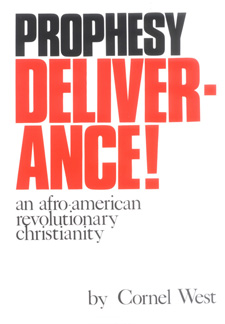_____________________________
"[Cornel] West is careful to distinguish his inquiry into power in relationship to race from what he calls the historiography of the 'revisionists and vulgar Marxist(s),' who focus more or less on power as it operates through concrete historical actors, be they individuals (such as sovereigns or any other potentate) or collectives (such as parliaments or mobs). West tells us that his mode of genealogical inquiry focuses instead on the 'subjectless powers' driving modern Western discourse....
West's genealogy powerfully shows the epistemological ... conditions that made possible the idea of white supremacy as an expression of modern racism, but it does not provide insight into the mechanisms by which those discursive factors interacted so that modern racism and the idea of white supremacy moved beyond epistemic possibility and into discursive actuality....
 [David Theo] Goldberg, in framing his own critique of West on similar matters, puts his finger on the problem: 'The concept of "racialized discourse" (must) show how, methodologically, socioeconomic materiality ... and ideological conception ... are mutually interactive and codetermining.' Goldberg further argues that to penetrate to the level of how socioeconomic materiality and idealogical conception ... interact is, among other things, to uncover the 'grammar,' or the deep structure, of modern racial discourse."
[David Theo] Goldberg, in framing his own critique of West on similar matters, puts his finger on the problem: 'The concept of "racialized discourse" (must) show how, methodologically, socioeconomic materiality ... and ideological conception ... are mutually interactive and codetermining.' Goldberg further argues that to penetrate to the level of how socioeconomic materiality and idealogical conception ... interact is, among other things, to uncover the 'grammar,' or the deep structure, of modern racial discourse."(In other words, it is one thing to say that racism comes down to individual vices such as pride and greed, another thing to point to the development of causative societal structures, and another thing still to discuss the underlying patterns of thought or language which have served to enable racial privileging to flourish--often in ways uneasily detected by those who are privileged)
- from Part One, "The Drama of Race: Toward a Theological Account of Modernity,"
namely the section dealing with "Cornel West's Genealogy of Race," pages 45, 50-51.
next up: "Michel Foucault's Genealogy of Race"

No comments:
Post a Comment